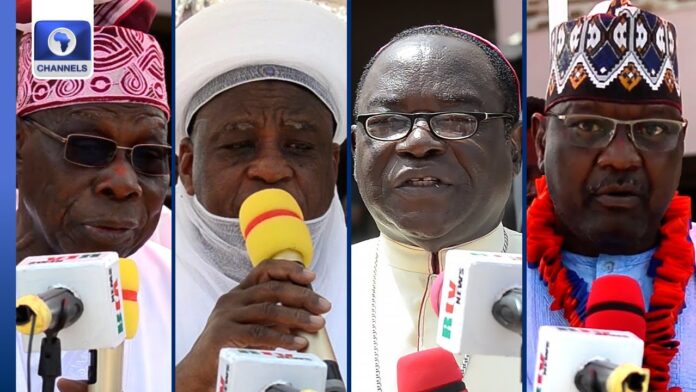Former President Olusegun Obasanjo has called on Nigeria’s political and security leadership to move beyond conventional thinking in addressing the Boko Haram insurgency that has plagued the nation for over a decade.
Obasanjo made the remarks on Friday in Abuja during the launch of “Scars: Nigeria’s Journey and the Boko Haram Conundrum,” written by retired General Lucky Irabor, former Chief of Defence Staff. The former president emphasized that resolving the crisis requires a more comprehensive grasp of what drives the insurgent group.
Reflecting on a 2011 visit to Maiduguri following the United Nations office bombing, Obasanjo said he met with insurgents to understand their motivations firsthand. What he discovered challenged common assumptions about the group’s objectives.
“I found they were not really aiming for anything political or seriously religious, but seeking a better life,” he stated, questioning why the conflict continues 15 years later. He called for more forward-thinking approaches, noting that Boko Haram, banditry, and kidnapping have become increasingly interconnected.
Bishop Matthew Hassan Kukah of Sokoto Catholic Diocese described the insurgency as a reflection of unresolved tragedies, citing victims like Leah Sharibu and the Chibok schoolgirls. He challenged the common label “Boko Haram,” pointing out that the group’s actual name—Jama’at Ahl al-Sunna li al-Da’wa wa al-Jihad—reveals a more complex ideological dimension.
Kukah contended that military operations alone cannot eliminate the group, observing a fundamental difference in motivation: insurgents fight with no expectation of survival, while soldiers fight to return home. He also criticized some northern politicians for manipulating religious sentiment to gain power, warning that using religion as a tool for political control damages Islam itself.
Babagana Monguno, former National Security Adviser, pointed to poor governance and fragmented national unity as primary obstacles to lasting peace. He argued that security cannot be achieved without building cohesion across the country, adding that government shortcomings continue to fuel unrest.
The Sultan of Sokoto, Alhaji Sa’ad Abubakar III, addressed widespread misunderstandings about jihad, explaining that the term means striving for excellence rather than violence. He traced the insurgents’ core grievance back to governance failures rather than opposition to Western education.
“Many of them have been educated. Their grievance is rooted in bad governance; they want freedom and the right to live as they feel they should,” the Sultan said.
The gathering highlighted broad agreement among speakers that ending the Boko Haram threat demands innovative strategies, representative governance, and acknowledgment of how ideology, political failures, and social equity intersect in the ongoing conflict.

